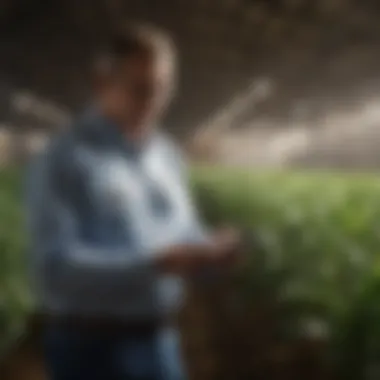The Role of a Certified Agronomist in Modern Agriculture


Intro
The agricultural sector faces numerous challenges today, including climate change, resource depletion, and the need for sustainable food production. Within this intricate system, certified agronomists play a pivotal role. Their expertise spans various domains within agriculture, contributing to efficient practices and sustainability. Understanding their functions and influence is crucial for all stakeholders in this vital industry, including farmers, educators, and policymakers.
Topic Overview
Definition of Key Terms
Agronomy refers to the science of soil management and crop production. It encompasses a wide range of practices and knowledge required to improve agricultural productivity while ensuring environmental sustainability. A certified agronomist is a professional who has earned formal recognition through educational qualifications, experience, and adherence to ethical standards in agronomy. They are equipped with the knowledge to advise on optimal crop management, soil health, and resource conservation.
Relevance in Agriculture, Horticulture, and Agronomy
Certified agronomists are essential for modern farming, specifically in promoting sustainable agriculture. This includes providing technical assistance in crop rotation, pest management, and soil fertility. Their work directly impacts both small-scale and industrial farming. Through research and practical application, agronomists aid in enhancing food security and maintaining a balance with nature. Their insights benefit not just farmers but also educators seeking to impart knowledge and policymakers aiming to develop sustainable agricultural regulations.
Current Trends and Innovations
Recent Advancements in the Field
The field of agronomy has witnessed substantial advancements due to research and technological progress. Recent studies focus on precision agriculture, which uses data analytics to enhance crop yields. This approach minimizes waste of resources, allowing for better management of inputs like water and fertilizers.
Emerging Technologies and Practices
Several technologies are emerging within the field of agronomy:
- Drones and Remote Sensing: These tools provide aerial insights into crop health and soil conditions.
- Genetic Modification: Crop modifications enhance resilience to pests and environmental stressors, providing sustainable solutions for food production.
- Biopesticides: An alternative to chemical pesticides, these products use natural organisms to manage pests, bringing ecological benefits.
Practical Applications
Steps to Implement Agronomic Practices
- Assess Soil Health: Regular soil testing helps identify nutrient deficiencies and pH levels.
- Crop Rotation Planning: Understanding which crops improve soil health when rotated.
- Integrated Pest Management: Employing a mixture of techniques to keep pest populations under control.
- Water Management: Utilizing efficient irrigation systems to optimize water use.
Tips and Best Practices for Implementation
- Stay informed about local agricultural policies and scientific findings.
- Collaborate with local agronomy experts for tailored advice.
- Monitor and adapt practices based on seasonal changes and new information.
"The role of certified agronomists in agriculture is crucial for ensuring sustainable practices and enhancing food production efficiency. Their expertise offers invaluable insights into contemporary challenges."
Intro to Agronomy
Agronomy is a critical science within the field of agriculture that significantly influences food production and sustainability. Understanding agronomy provides insight into how crops are cultivated, enhanced, and managed for optimal yields. This knowledge is essential, especially in a world where food security is a pressing concern.
In this article, we will explore the definition and importance of agronomy, laying the groundwork for understanding the role of a certified agronomist. The relevance of agronomy transcends basic farming practices. It is fundamental to addressing challenges like climate change, resource management, and evolving agricultural technologies. Through effective agronomic practices, farmers can improve productivity while ensuring environmental health. This is particularly pertinent as global populations rise and arable land becomes scarcer.
By delving into agronomy, readers will recognize its multifaceted benefits, which include higher crop yields, improved soil health, and enhanced pest management strategies. Furthermore, it highlights the necessity for certified agronomists to guide farmers through these complex challenges, making this exploration vital for anyone interested in modern agricultural practices.
Definition of Agronomy
Agronomy is the branch of agriculture that focuses on the study of crops and how they are grown. It encompasses various aspects of plant biology, soil science, climate, and farm management. An agronomist uses this knowledge to develop methods that improve crop production while maximizing sustainability efforts.
This discipline addresses plant genetics, crop rotation, and the right usage of fertilizers and pesticides. An agronomist's work involves understanding the interactions between plants and soil, which is crucial for successful cultivation. Hence, agronomy is not merely about farming; it is a scientific approach to managing land and crops in a sustainable way.
Importance of Agronomy
The importance of agronomy can hardly be overstated. It plays a vital role in ensuring that agricultural systems are efficient, productive, and environmentally friendly. Some key points include:
- Food Security: As population grows, the demand for food increases. Agronomy helps develop practices that maximize yields and ensure food supply.
- Sustainability: Agronomic practices promote the responsible use of resources, thus maintaining environmental balance.
- Economic Viability: Effective agronomy can significantly reduce costs associated with farming while improving the financial outcomes for farmers.
- Innovation: Agronomy encourages the adoption of new technologies and practices that enhance crop production.
"Agronomy is the cornerstone of sustainable agriculture, ensuring we meet our food needs without compromising future generations."
Qualifications of a Certified Agronomist
The significance of a certified agronomist in modern agriculture cannot be overstated. Their qualifications form the foundation for their expertise, guiding farmers and stakeholders in the industry. Given the complexities of contemporary agriculture, possessing the right educational and professional background is crucial for anyone seeking to make substantial contributions in this field.
Educational Background


A certified agronomist typically holds a degree in agronomy, plant science, agricultural engineering, or a closely related field. This educational track provides a solid grounding in essential topics such as soil science, pest management, and crop production.
Courses taken during an undergraduate program often include:
- Plant Physiology
- Soil Fertility
- Pest Management Strategies
- Ecological Principles in Agriculture
- Agricultural Economics
Many agronomists continue their education through graduate studies, attaining a master's or even a doctoral degree. Further academic pursuits allow for specialization in certain areas, such as sustainable agriculture or biotechnology, enhancing their skill set and increasing their value in the agricultural sector. Higher qualifications also demonstrate a commitment to ongoing learning, which is critical given the rapid evolution of agricultural practices.
Certification Process
The certification process is an essential aspect of becoming a recognized agronomist. This usually involves passing a comprehensive examination that tests knowledge of agricultural principles, practices, and regulations. Aspiring agronomists may also need to demonstrate practical experience through internships or work under the supervision of certified professionals.
Several organizations provide certification, most notably:
- The American Society of Agronomy
- The Association of American Plant Food Control Officials
- State-specific agricultural associations
Maintaining certification is important as it often requires ongoing education. Certified agronomists must stay abreast of new scientific findings, technologies, and regulatory changes. This dedication to professional growth and knowledge ensures that they can effectively advise farmers on best practices and sustainable methods.
A well-qualified agronomist is not just a scientist but also a vital resource for farmers, integrating knowledge of science and practical applications to boost efficiency and sustainability in agriculture.
Core Responsibilities
The role of a certified agronomist encompasses several crucial responsibilities, which are integral to successful agricultural practices. These responsibilities include soil management, crop science, and pest management. Each of these areas contributes not only to the efficiency of agricultural operations but also to the sustainability of the environment.
Soil Management
Soil management is the foundation of agronomy. A certified agronomist evaluates soil condition, nutrient levels, and health to promote optimal growth conditions for crops. This process involves soil testing to assess pH, organic matter, and nutrient profiles. Using this data, agronomists recommend amendments, such as fertilizers or lime, to correct deficiencies. The practice of effective soil management leads to improved crop yields and enhances soil fertility over time. Regardless of scale, whether it is small family farms or large agribusinesses, healthy soil directly correlates to productivity.
Key considerations in soil management include:
- Soil Testing: Regular testing to monitor soil health.
- Nutrient Management: Balancing nutrient input for sustainable growth.
- Erosion Control: Implementing practices to prevent soil erosion has long-term benefits.
Crop Science
In the arena of crop science, agronomists employ scientific methods to improve crop production and agricultural sustainability. This involves selecting appropriate crops based on local climate, soil type, and market demands. Furthermore, agronomists study crop rotations, which help manage pests and diseases, while also maintaining soil health. They also remain informed about new varieties, such as drought-resistant or high-yield strains, to enhance productivity.
Additionally, crop science emphasizes integrating biology and technology. For instance, precision agriculture uses data to manage field variability, leading to tailored approaches for planting, watering, and treating crops. This results in better resource use and minimal environmental impact.
Pest Management
Pest management is another critical responsibility of a certified agronomist. This involves identifying pest species, understanding their life cycles, and implementing strategies to control them effectively. Rather than relying solely on chemical pesticides, which can have adverse environmental effects, many agronomists advocate for integrated pest management (IPM). This strategy combines cultural, biological, and chemical tactics, aiming for long-term prevention rather than reactive measures.
"Integrated pest management is essential for promoting sustainable agricultural practices and reducing reliance on chemical options."
By monitoring pest populations and employing biological controls, agronomists can help maintain a balanced ecosystem. This results in healthier crops and a reduction in harmful pesticide usage.
In summary, the core responsibilities of a certified agronomist are pivotal to both agricultural productivity and environmental health. Their role in soil management, crop science, and pest management ensures informed decisions that lead to optimal outcomes for farmers and the broader agricultural community.
Techniques Employed by Agronomists
Agronomists play a crucial role in modern agriculture by utilizing various advanced techniques. These methods help them address the challenges faced in farming while enhancing efficiency and sustainability. Understanding these techniques is essential for farmers and enthusiasts aiming to improve their practices.
Field Trials
Field trials are a fundamental technique employed by agronomists. Through these trials, agronomists can assess the performance of different crop varieties, soil management practices, and pest control strategies under real-world conditions. This practical approach allows them to gather valuable data on what works best for specific environments.
For farmers, this means having access to scientifically-backed decisions that can lead to higher yields and better crop quality. Agronomists meticulously plan these trials, taking into account seed selection, planting techniques, and environmental factors. The insights gained can inform future practices and play a significant role in developing new agricultural methodologies.
Data Analysis
Data analysis is vital in the field of agronomy. Agronomists collect extensive data from various sources, including soil tests, weather patterns, and crop performance metrics. By interpreting this data, they can identify trends and make informed recommendations.
The importance of data analysis can not be overstated. It allows agronomists to:
- Predict yields: By analyzing historical data, they can forecast potential outcomes based on current conditions.
- Optimize resource use: Effective use of fertilizers, water, and pesticides can be achieved by understanding their past effects.
- Improve decision making: With data-driven insights, farmers can make choices that enhance sustainability and profitability.


Advisory Services
Advisory services are another key aspect of an agronomist's role. They serve as consultants to farmers, offering tailored advice on various agricultural practices. This consultation can range from crop selection based on soil composition to advising on sustainable pest management strategies.
By providing practical solutions and ongoing support, agronomists empower farmers to adopt innovative practices. Such advisory services help bridge the gap between scientific knowledge and on-the-ground application, ensuring that farmers can maximize their productivity without compromising the health of their land.
"Agronomists blend scientific principles with practical application, improving farming success across the board."
Sustainable Practices in Agronomy
Sustainable practices in agronomy represent a vital aspect of modern agriculture. These practices aim to meet the needs of the present without compromising the ability of future generations to meet their own needs. In a world facing climate change, resource depletion, and a growing population, the role of sustainable agronomy becomes more critical. Certified agronomists are at the forefront of this movement, employing techniques that promote environmental health, economic viability, and social equity.
By integrating sustainable practices, agronomists help farmers enhance productivity while minimizing negative impacts on the environment. This includes improving soil health, managing pests responsibly, and ensuring efficient use of water resources. The adoption of these practices leads not only to better crop yields but also to preserving biodiversity and maintaining ecosystem stability.
Integrated Pest Management
Integrated Pest Management (IPM) is a cornerstone of sustainable practices in agronomy. It focuses on the careful consideration of all available pest control techniques and integrates them into a single management plan. This method reduces reliance on chemical pesticides, thus minimizing their impact on the environment.
Key components of IPM include:
- Monitoring: Regularly checking pest populations and their natural enemies.
- Thresholds: Determining action thresholds to decide if pest control is needed.
- Prevention: Using cultural and biological practices to prevent pests.
- Control: Employing targeted chemical applications when necessary.
The benefits of IPM are significant. It enhances crop health, reduces input costs, and decreases the risk of pest resistance. Moreover, IPM enhances the safety of food products and protects the agroecosystem.
Soil Conservation Techniques
Soil conservation is another essential element of sustainable practices. Healthy soil is fundamental for achieving high agricultural productivity. Agronomists advocate for various soil conservation techniques that help maintain soil quality and prevent erosion.
Important techniques include:
- Crop Rotation: Growing different crops in succession to enhance soil fertility.
- Cover Cropping: Planting crops during off-seasons to protect soil from erosion.
- Conservation Tillage: Reducing tillage to maintain soil structure and moisture.
These techniques prevent soil degradation and promote moisture retention. They contribute to increased carbon sequestration and support sustainable farming practices.
Water Management Strategies
Water management is crucial in the context of sustainable agriculture due to water scarcity challenges faced globally. Effective water management strategies ensure that water resources are used efficiently while meeting crop irrigation needs.
Key strategies include:
- Drip Irrigation: A targeted irrigation method that minimizes water wastage.
- Rainwater Harvesting: Collecting and storing rainwater for agricultural use.
- Soil Moisture Monitoring: Using technology to assess soil moisture levels and optimize irrigation schedules.
Implementing such strategies not only conserves water but also improves crop resilience to drought conditions. Overall, sustainable water management enhances agricultural productivity while ensuring resource sustainability.
Sustainable practices, including IPM, soil conservation, and water management, are crucial for modern agriculture. Certified agronomists play a key role in promoting these practices to ensure food security and environmental stewardship.
Technological Advancements in Agronomy
Technological advancements in agronomy have transformed the agricultural landscape. These innovations have provided agronomists with tools to enhance productivity while preserving the environment. In the face of global challenges, including population growth and climate change, modern agronomy relies heavily on technology to optimize crop yields and resource management.
Precision Agriculture
Precision agriculture refers to systems that utilize technology to precisely manage field variability. It involves the use of GPS, sensors, and drones to monitor field conditions. Agronomists apply these technologies to make informed decisions on planting, fertilization, and irrigation. By tailoring practices to specific conditions within fields, certified agronomists can minimize input waste and maximize crop growth.
Benefits of precision agriculture include:
- Efficiency: Resources are used more effectively, leading to lower costs.
- Higher Yields: Targeted interventions promote healthier crop growth.
- Sustainability: Reducing chemical input helps protect the environment.
Data-Driven Decision Making
Data-driven decision making is essential for modern agronomy. It involves collecting and analyzing diverse data sets to inform agricultural practices. Certified agronomists rely on data from soil tests, weather patterns, and crop performance. This information guides key decisions, such as which crops to plant and when to apply fertilizers.
The advantages of data-driven approaches include:
- Timeliness: Quick access to data allows for prompt action in the field.
- Precision: Decisions are based on empirical evidence, reducing reliance on guesswork.
- Predictive Analytics: Historical data can help forecast future outcomes, assisting farmers in planning.


Remote Sensing Technologies
Remote sensing technologies offer a powerful way to gather information about crops and fields. These technologies include satellite imagery and aerial drone photography. Agronomists use remote sensing to assess crop health, monitor soil moisture, and evaluate pest pressure from a distance. This capability is invaluable for managing large agricultural operations.
Some key aspects of remote sensing technologies are:
- Real-Time Monitoring: Continuous data flow helps track changes in field conditions.
- Enhanced Analysis: High-resolution images enable detailed assessments of plant health.
- Cost-Effectiveness: Efficiently covers large areas without the need for extensive manual labor.
"Technological advancements are no longer optional in agriculture. They are essential for survival and success in the industry today."
Economic Impact of Agronomists
The economic impact of certified agronomists cannot be overstated in today’s agricultural landscape. They play a significant role in enhancing agricultural practices that lead to improved crop yields and cost efficiency. Agronomists help farmers adopt practices that are not only environmentally sustainable but also economically viable. Their expertise contributes towards the productivity of the agricultural sector, which in turn influences national economies. The integration of their knowledge with current trends leads to optimized use of resources, better decision-making, and ultimately, increased profitability for farmers.
Influence on Crop Yield
Crop yield is a critical metric in agriculture. The role of agronomists here is essential. They provide insights into various factors that can enhance yield, such as soil health, crop variety selection, and proper pest management. For instance, agronomists analyze soil types and recommend suitable crops that can thrive in specific conditions. They also take into account climatic variables to help farmers choose the right planting and harvesting times.
Research shows that successful agronomy practices can increase crop yield by up to 30% compared to uncontrolled methods. This increase not only benefits individual farmers, but also contributes to broader economic stability by ensuring food security.
- Soil Health: Agronomists suggest soil amendments and nutrient management techniques that can significantly enhance soil fertility and structure.
- Crop Rotation: Implementing rotation strategies can prevent soil depletion and improve overall yield.
- Advanced Varieties: By introducing crop varieties that are genetically engineered for better performance, agronomists increase the productivity potential.
"The expertise of agronomists in crop management strategies translates directly into higher yields and more resilient agricultural systems."
Cost Efficiency in Agriculture
Cost efficiency is another area where certified agronomists make a substantial impact. Agriculture often involves significant investments in seeds, fertilizers, and equipment. Agronomists help farmers minimize wastage and maximize the impact of their investments.
They do this through various means:
- Resource Optimization: By analyzing the specific needs of a farm, agronomists can recommend precise amounts of fertilizers and water, reducing both costs and environmental impact.
- Preventive Measures: Agronomists guide farmers on pest and disease prevention, saving money on costly pesticides and crop loss.
- Technology Implementation: Utilizing precision agriculture tools allows farmers to manage inputs better, controlling costs without sacrificing yield.
The Future of Agronomy
The landscape of agriculture is changing rapidly. It is of utmost importance to understand how certified agronomists will play pivotal roles in this evolving environment. Modern challenges such as food security, climate change, and technological advancements are affecting the way we farm. The future of agronomy promises to address these issues while simultaneously promoting sustainability. Understanding the future is essential for all those involved in agriculture, including farmers, researchers, and policy-makers.
Trends in Agronomy Education
Agronomy education is undergoing significant transformation. Educational institutions are now integrating modern issues into their curricula. This includes areas like precision agriculture, sustainable practices, and advancements in biotechnology. The shift aims to produce specialists who are capable of addressing contemporary challenges. New educational paths provide in-depth knowledge and practical experience in crop management and sustainable farming. Institutions are increasingly offering online courses and short-term training, making it more accessible.
Key components of modern agronomy education include:
- Hands-on Experience: Practical training through internships or fieldwork.
- Interdisciplinary Approach: Collaborating with fields like environmental science and data analytics.
- Continuous Learning: Encouraging ongoing education through workshops and seminars.
By embracing these trends, agronomy education prepares future experts to tackle challenges with innovative solutions.
Adapting to Climate Change
Climate change presents serious challenges for agriculture. Certified agronomists will be essential in devising strategies to mitigate its impacts. This includes developing crop varieties that are resilient to extreme weather conditions. Agronomists will also work on methods to improve soil health, ensuring that it can retain moisture and nutrients under stress. Collaboration with environmental scientists can lead to comprehensive strategies for conservation.
Agronomists must also focus on educating farmers about adaptive practices. This includes crop rotation, cover cropping, and water conservation tactics. These methods can significantly enhance resilience against climate fluctuations.
"Adaptability in agriculture is not just a choice, but a necessity for sustainability."
Practicing adaptive strategies helps maintain crop yields in unpredictable weather. Farmers equipped with this knowledge can make informed decisions, ultimately securing their livelihoods in the face of climate change.
Closure
The conclusion of this article encapsulates the critical reflections on the substantial contributions made by certified agronomists in modern agriculture. Their expertise is pivotal in areas such as soil management, crop science, and sustainable practices. As we navigate the complexities of contemporary agricultural demands, the insight from agronomists becomes indispensable. Their ability to align agricultural practices with sustainability is of great benefit to both farmers and the environment.
Recap of Key Points
In summary, several fundamental aspects are worth reiterating:
- Education and Certification: A certified agronomist must possess a strong academic background combined with rigorous training to effectively contribute to agricultural methodologies.
- Core Responsibilities: Their primary responsibilities include soil health management, optimizing crop production through science, and effective pest management, ensuring robust yields while minimizing ecological impact.
- Sustainable Practices: Agronomists play a crucial role in developing sustainable practices, which encompass integrated pest management, soil conservation, and innovative water management strategies.
- Technological Advancements: The application of precision agriculture, data analytics, and remote sensing technologies are reshaping traditional farming methods to enhance productivity.
- Economic Impact: Agronomists directly influence crop yield optimization and cost efficiency, thereby significantly contributing to the economic viability of agriculture.
Final Thoughts on Agronomy's Role
Looking ahead, the role of agronomists is poised to become even more critical. As global challenges such as climate change and food security intensify, the expertise of certified agronomists will be essential.
The adaptability of agronomic principles in response to new technological developments and environmental considerations cannot be overstated. A proactive approach in agronomy can lead to sustainable farming practices that benefit both producers and consumers alike.
"Agronomy isn't just about crops; it's about cultivating a sustainable future for generations to come."



